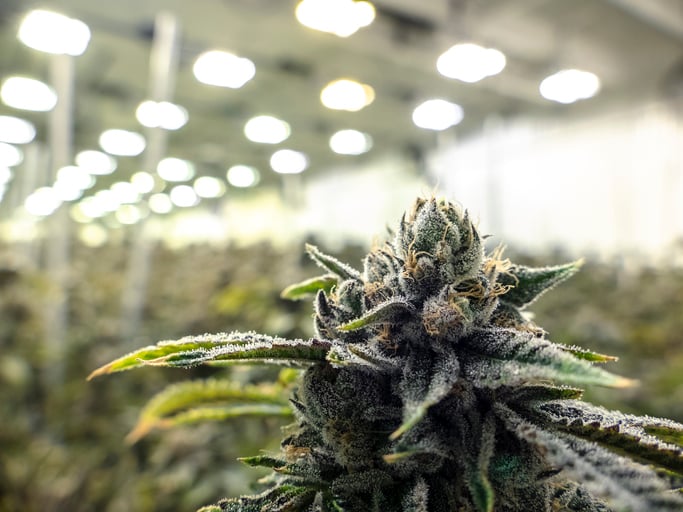It's nice being No. 1. And that's where Canopy Growth (CGC 4.65%) ranks in the cannabis industry in terms of market cap and market share in the key Canadian adult-use recreational market.
It isn't easy staying at the top, though. That's especially true in a fast-changing market like cannabis.
Where will Canopy Growth be in 10 years? There's no way to know for sure, of course, but here's a prediction of what the future could hold for this top cannabis producer.

Image source: Getty Images.
A few assumptions
Let's first make a few assumptions about the global cannabis industry. The most critical assumption is that the U.S. will revise federal laws in a way that allows Canopy Growth to enter the U.S. marijuana market.
This seems like a pretty safe bet to happen at some point within the next few years. Public support among Americans for marijuana legalization is at an all-time high. Passage of legislation to change federal marijuana laws looks like a slam-dunk in the U.S. House of Representatives. The votes are probably there in the Senate, as well, although Senate Majority Leader Mitch McConnell could prevent the bill from coming to a vote on the Senate floor.
President Trump has expressed his willingness to support changes to federal laws on marijuana. All of the current Democratic presidential candidates, with one exception, support the legalization of pot. The one holdout is former Vice-President Joe Biden, who currently leads in national polls for the Democratic presidential nomination. But there's probably a pretty good chance that Biden wouldn't oppose a measure that left marijuana legalization up to the states.
Another key assumption is that the U.S. Food and Drug Administration (FDA) establishes regulations for cannabidiol (CBD) products that aren't too burdensome for the industry. The FDA is in the process of gathering information to help in this process, recently conducting a public hearing that included input from a wide range of participants.
Shifting away from the U.S., it's important that European countries that have already legalized CBD and medical cannabis don't put too many obstacles in the way of a robust industry emerging. Germany already has laws in place that are fostering a rapidly growing medical cannabis market. It's probably not a bad assumption that other European countries will learn from Germany's success.
Finally, I'd count on a shakeout in the Canadian cannabis industry within the next two or three years as supply catches up with capacity. But I also expect that Canopy Growth will be one of the companies to emerge relatively unscathed, while lots of small cannabis producers get gobbled up or go out of business. The dust should be settled from this shakeout well before our 10-year window winds down.
In the top tier
With these assumptions in mind, where does that put Canopy Growth 10 years from now? My prediction is that the company will easily be in the top tier of global cannabis producers.
Tilray CFO Mark Castaneda recently stated that he thinks that "only three or four large players" will dominate the cannabis industry in the future. He expects that these top companies will split around 80% of the global market. I agree with this view.
But could Tilray CEO Brendan Kennedy's prediction that these top-tier companies will have market caps of $100 billion or more come true? I don't see that happening by 2029. However, I'm not as skeptical about Canopy Growth co-CEO Bruce Linton's idea that his company could eventually be bigger than its partner, alcoholic-beverage maker Constellation Brands (STZ 0.65%).
Currently, Constellation's market cap stands at nearly $36 billion. It's possible that Canopy could reach or surpass that level within the next 10 years.
Canopy Growth has plenty of what's called optionality -- multiple pathways for growth. There's the recreational market in Canada and the U.S. (assuming federal laws change in a way that allows Canopy to enter the U.S. market). Other countries are likely to legalize recreational pot over the next few years, as well. Medical cannabis presents a huge global opportunity. And the use of cannabinoids such as CBD could be an even bigger market over the long run.
The best answer
I think that the best answer to the question of where Canopy Growth will be in 10 years is this one: It will be part of Constellation Brands. If the assumptions laid out earlier are right, a full acquisition of Canopy by Constellation seems like a no-brainer.
Constellation already owns 38% of Canopy Growth. It holds warrants that allow it to up its stake to more than 50%. If Canopy's right to acquire U.S.-based Acreage Holdings is exercised, though, the exercising of Constellation's warrants wouldn't give the big beverage company majority control of Canopy. However, I don't think that will be an impediment to Constellation buying Canopy outright if it chooses to do so.
If my earlier assumptions don't pan out -- especially the changes to U.S. federal marijuana laws -- everything changes for Canopy Growth's future. But I think the odds are in Canopy's favor to stay No. 1 or at least in a close second place for a long time to come -- whether as a stand-alone entity or a division within Constellation Brands.







